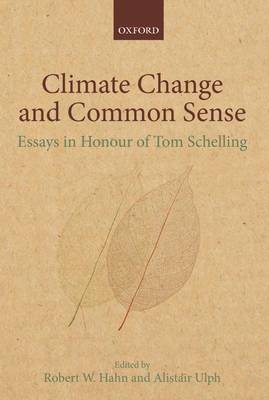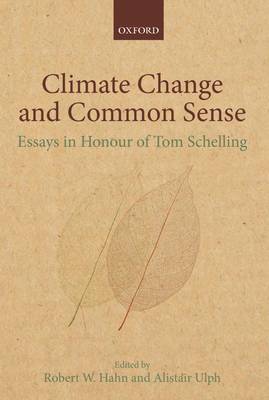
- Afhalen na 1 uur in een winkel met voorraad
- Gratis thuislevering in België vanaf € 30
- Ruim aanbod met 7 miljoen producten
- Afhalen na 1 uur in een winkel met voorraad
- Gratis thuislevering in België vanaf € 30
- Ruim aanbod met 7 miljoen producten
Zoeken
Climate Change and Common Sense
Essays in Honour of Tom Schelling
Alistair Ulph, Thomas C Schelling
Hardcover | Engels
€ 281,95
+ 563 punten
Omschrijving
There is widespread agreement that climate change is a serious problem. If we fail to regulate greenhouse gases that contribute to global warming, or use alternative strategies for addressing the problem, the damages could be significant, and perhaps catastrophic.
After several international meetings in which nation-states have tried unsuccessfully to address the climate change problem, there is a sense of frustration and urgency: frustration at the slow pace at which countries are moving toward an international agreement to reduce greenhouse gas emissions; urgency because of the growing evidence that climate change is a serious problem that should be addressed globally and quickly.
This book takes a close look at the fundamental political and economic processes driving climate change policy. It identifies institutional arrangements and policies that are needed to design more effective climate change policy. It also examines ethical and distributional arguments that are critical in understanding and framing the climate debate. The book is built around a conference honouring Tom Schelling that took place at the Sustainable Consumption Institute at The University of Manchester. Each chapter represents a significant contribution to the literature on the political economy of climate change.
After several international meetings in which nation-states have tried unsuccessfully to address the climate change problem, there is a sense of frustration and urgency: frustration at the slow pace at which countries are moving toward an international agreement to reduce greenhouse gas emissions; urgency because of the growing evidence that climate change is a serious problem that should be addressed globally and quickly.
This book takes a close look at the fundamental political and economic processes driving climate change policy. It identifies institutional arrangements and policies that are needed to design more effective climate change policy. It also examines ethical and distributional arguments that are critical in understanding and framing the climate debate. The book is built around a conference honouring Tom Schelling that took place at the Sustainable Consumption Institute at The University of Manchester. Each chapter represents a significant contribution to the literature on the political economy of climate change.
Specificaties
Betrokkenen
- Auteur(s):
- Uitgeverij:
Inhoud
- Aantal bladzijden:
- 279
- Taal:
- Engels
Eigenschappen
- Productcode (EAN):
- 9780199692873
- Verschijningsdatum:
- 7/04/2012
- Uitvoering:
- Hardcover
- Formaat:
- Genaaid
- Afmetingen:
- 157 mm x 236 mm
- Gewicht:
- 589 g

Alleen bij Standaard Boekhandel
+ 563 punten op je klantenkaart van Standaard Boekhandel
Beoordelingen
We publiceren alleen reviews die voldoen aan de voorwaarden voor reviews. Bekijk onze voorwaarden voor reviews.








